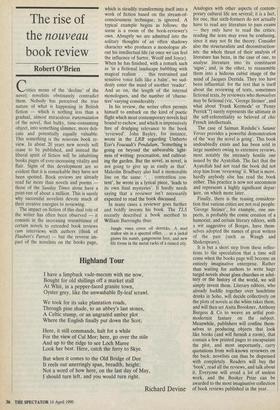The rise of
the nouveau
book review
Robert O'Brien
Critics moan of the 'decline' of the novel; novelists obstinately contradict them. Nobody has perceived the true nature of what is happening in British fiction — which is nothing less than a gradual, almost miraculous transmutation of the novel, that bulky, time-consuming object, into something slimmer, more deli- cate and potentially equally valuable. This something is the nouveau book re- view. In about 20 years new novels will cease to be published, and instead the liberal spirit of fiction will be inhabiting books pages of ever-increasing vitality and flair. Signs of this development are so evident that it is remarkable they have not been spotted. Book reviews are already read far more than novels and poems those of the Sunday Times alone have a print-run of about a million. This is surely why successful novelists devote much of their creative energies to reviewing.
The impact on fiction of this dual role of the writer has often been observed — it consists in the increasing resemblance of certain novels to extended book reviews cum interviews with authors (think of Flaubert's Parrot) — but the reverse im- pact of the novelists on the books page, which is steadily transforming itself into a work of fiction based on the stream-of- consciousness technique, is ignored. A typical example begins as follows: the scene is a room of the book-reviewer's own. Abruptly we are admitted into the solitary thoughts of an often shadowy character who produces a monologue ab- out his intellectual life (at once we can feel the influence of Sartre, Woolf and Joyce). When he has finished, with a remark such as 'in a fictional landscape bubbling with magical realism . . . this restrained and sensitive voice falls like a balm', we sud- denly enter the mind of another 'reader'. And so on, the length of the internal monologues, and the number of 'charac- ters' varying considerably.
In his review, the writer often permits himself to embark on the kind of poetic flight which most contemporary novels feel bound to eschew, and which is impressively free of drudging relevance to the book `reviewed'. John Bayley, for instance, wrote in the LRB regarding Umberto Eco's Foucault's Pendulum, 'Something is going on beyond the unbearable light- ness of writing: procreation, and cultivat- ing the garden. But the novel, as novel, is not going to give up as easily as that'. Malcolm Bradbury also had a memorable line on the same: contentless con- tent', he wrote in a lyrical piece, 'leads to its own final mysteries'. It hardly needs saying that a reviewer isn't necessarily expected to read the book discussed.
In many cases a reviewer goes further and boldly invents his book. The TLS recently described a book ascribed to William Burroughs thus:
Jungle vines cover oil derricks. A mad realtor sits in a spectral office. . . as a jackal gnaws his numb, gangrenous foot, and new life forms in the metal racks of a ruined city.
Analogies with other aspects of contem- porary cultural life are several; it is a fact, for one, that sixth-formers do not actually have to read any literature to pass exams — they only have to read the critics; reading the texts may even be confusing, since it may not fit the theory. Consider also the structuralists and deconstruction- ists: the whole thrust of their analysis of literature has been, in the case of one, to analyse literature into its constituent `signs', and, in the other, to reassemble them into a hideous cubist image of the mind of Jacques Derrida. They too have been influential: for the text that is itself about the reviewing of texts, sometimes fictional texts, by reviewers who themselves may be fictional (viz, 'George Steiner', and what about 'Frank Kermode' or 'Penny Perrick'?) surely represents the ultimate in the self-referentiality so beloved of chic French intellectuals.
The case of Salman Rushdie's Satanic Verses provides a powerful demonstration of the 'way the novel is going'. This book undoubtedly exists and has been sold in large numbers owing to extensive reviews, most notably the intensely hostile one issued by the Ayatollah. The fact that the Ayatollah had not read the book did not stop him from 'reviewing' it. What is more, hardly anybody else has read the book either. This practice is now not uncommon and represents a highly significant depar- ture, on which more later.
Finally, there is the teasing considera- tion that various critics are not real people: `George Steiner', for example, one sus- pects, is probably the comic creation of a humorist; and certain literary editors, with a wit suggestive of Borges, have them- selves adopted the names of great writers of the past (such as Waugh and Shakespeare).
It is but a short step from these reflec- tions to the speculation that a time will come when the books page will become an entirely imaginative enterprise. Rather than waiting for authors to write huge turgid novels about glass churches or adul- tery or the history of the world, we will simply invent them. Literary editors, who already huddle together over lunchtime drinks in Soho, will decide collectively on the plots of novels as the whim takes them, and will then set Anita Brookner, Anthony Burgess & Co to weave an artful post- modernist fantasy on the subject. Meanwhile, publishers will confine them- selves to producing objects that look like books (and will furnish a room), that contain a few printed pages to encapsulate the plot, and most importantly, carry quotations from well-known reviewers on the back: novelists can thus be dispensed with completely. Readers will buy the `book', read all the reviews, and talk about it. Everyone will avoid a lot of useless work, and the Booker Prize can be awarded to the most imaginative collection of book reviews published in the year.


















































 Previous page
Previous page